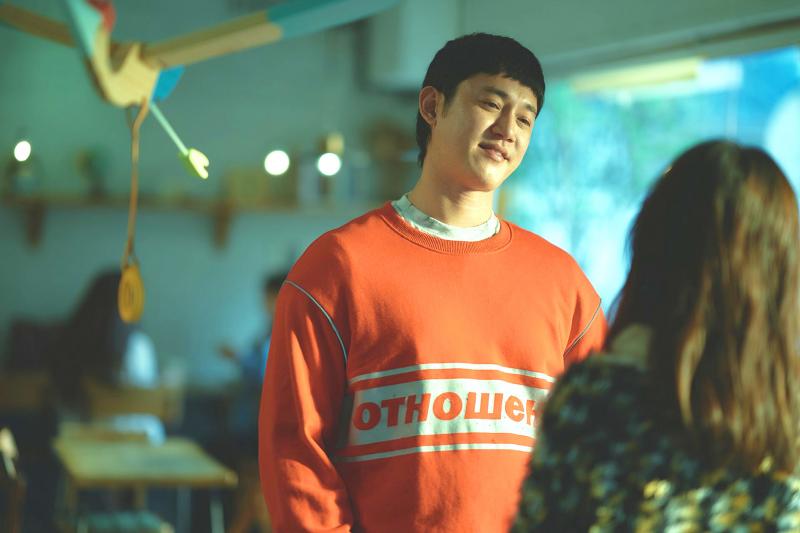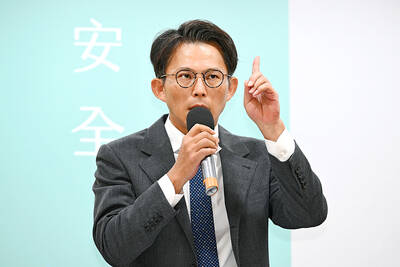Five years prior to the events portrayed in this film, Chin-chin (Eve Ai, 愛怡良) blocked two people on Facebook: Shu-wei (Fu Meng-po, 傅孟柏), her former work crush, and Chih-yang (Chris Wu, 吳慷仁), a self-proclaimed “love expert” and master of breaking up with women.
Since then Chin-chin has buried herself in work, earning the nickname “facial paralysis sister” (面癱姐) by her subordinates for her cold and serious demeanor. But when she is tasked with developing a love-based mobile game, she starts reevaluating her life and relationships. Meanwhile, the eccentric, happy-go-lucky Chih-yang forces himself back into her life. As the story progresses, Chih-yang starts coming to terms with his life choices as well.
It’s a simple, everyday story about facing regrets over missed opportunities, told in a quirky, somewhat disorderly manner. It especially speaks to single office workers in their 30s and 40s who have enough love and career experience but still wonder where life is going without an established path to follow, and perhaps the plot runs all over the place because that’s how it feels to be in that situation.

Photo courtesy of Warner Bros
A more focused, nuanced story would definitely have made the film stronger, but I Missed You still does its job as a feel-good, tear-jerking Lunar New Year plus Valentine’s day holiday flick. The favorable box office sales reflect that.
Despite the intentionally fast-paced and choppy storytelling with parts left to imagination, it’s not too difficult to understand and put the pieces together as the film goes on. The directing duo of Mag Hsu (許譽庭) and Hsu Chih-yen (許智彥), who were nominated for a Golden Horse in 2018 for Dear Ex (誰先愛上他), are wise to not keep this frenetic style up for the entire movie. The style changes pace and becomes more grounded toward the second half.
Although the two leads seem to be complete opposites — Chin-chin is a hard-driving, outspoken corporate team leader in a business suit while Chih-yang is a frivolous, good-for-nothing loafer who wears oversized hip-hop clothing — they hide similar self-loathing and vulnerability.

Photo courtesy of Warner Bros
The two leads do a good job portraying their duality through flashbacks; they were once quite different people than shown in the film, changed greatly by past events. While Wu is a veteran thespian with several major acting accolades, it’s surprising to find Ai, who is a well-known singer-songwriter, taking a lead role here in her acting debut. She also wrote the theme song for the movie.
Popular singer-songwriter 9m88 plays a minor role in the film as one of the young staffers on Ai’s team; her youthful energy and musings of how she wants to be after she turns 30 provides a contrast to Chin-chin’s situation.
There’s no big message, mystery or even a rushing climax in this film. Just don’t block people on social media before facing them first, or at least saying a proper goodbye, otherwise it is hard to move forward. As Chih-yang tells Chin-chin in one scene: “That day, only your pride walked away; you’re still standing on the same spot.” Sometimes the simplest themes hit closest to home.
Finally, if you’re familiar with Taiwanese pop culture, look for all the big-name Easter eggs that are dispersed throughout the movie.

Before the recall election drowned out other news, CNN last month became the latest in a long line of media organs to report on abuses of migrant workers in Taiwan’s fishing fleet. After a brief flare of interest, the news media moved on. The migrant worker issues, however, did not. CNN’s stinging title, “Taiwan is held up as a bastion of liberal values. But migrant workers report abuse, injury and death in its fishing industry,” was widely quoted, including by the Fisheries Agency in its response. It obviously hurt. The Fisheries Agency was not slow to convey a classic government

Not long into Mistress Dispeller, a quietly jaw-dropping new documentary from director Elizabeth Lo, the film’s eponymous character lays out her thesis for ridding marriages of troublesome extra lovers. “When someone becomes a mistress,” she says, “it’s because they feel they don’t deserve complete love. She’s the one who needs our help the most.” Wang Zhenxi, a mistress dispeller based in north-central China’s Henan province, is one of a growing number of self-styled professionals who earn a living by intervening in people’s marriages — to “dispel” them of intruders. “I was looking for a love story set in China,” says Lo,

It was on his honeymoon in Kuala Lumpur, looking out of his hotel window at the silvery points of the world’s tallest twin skyscrapers, that Frank decided it was time to become taller. He had recently confessed to his new wife how much his height had bothered him since he was a teenager. As a man dedicated to self-improvement, Frank wanted to take action. He picked up the phone, called a clinic in Turkey that specializes in leg lengthening surgery — and made a booking. “I had a lot of second thoughts — at the end of the day, someone’s going

The next few months will be critical in determining the future of the Taiwan People’s Party (TPP). Following party founder Ko Wen-je’s (柯文哲) arrest in September last year, Huang Kuo-chang (黃國昌) effectively became the de facto face of the party and officially became chairman in January. While Ko frequently criticized the ruling Democratic Progressive Party (DPP) and insinuated sinister intentions on the part of the DPP’s New Tide faction, his era was largely defined by the TPP slogan “rational, pragmatic, scientific,” albeit defined largely by his definition of what that meant. The tone and language used by the TPP changed dramatically